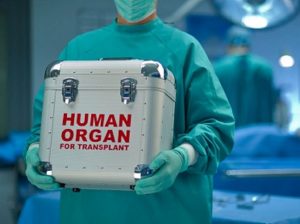The Volokh Conspiracy
Mostly law professors | Sometimes contrarian | Often libertarian | Always independent
Progress on the End Kidney Deaths Act
This legislation could save many lives by giving tax credits to kidney donors. But it would not be as good as full legalization of organ sales.

The bipartisan End Kidney Deaths Act (EKDA) is making some progress in Congress. Dylan Matthews of Vox has a helpful summary of the legislation and its importance:
A few months ago, I wrote about a proposal called the End Kidney Deaths Act, which seeks to make sure that every one of the more than 135,000 Americans who get diagnosed with kidney failure every year has access to a kidney transplant.
Its method is simple: a federal tax credit worth $10,000 a year for five years, paid to anyone who donates a kidney to a stranger. It's the kind of thing that would've helped a lot when I donated a kidney back in 2016. Elaine Perlman, a fellow kidney donor who leads the Coalition to Modify NOTA, which is advocating for the act, estimates the measure will save 100,000 lives over the first decade it's enacted, based on conversations with transplant centers on how many surgeries they can perform with their current resources….
Since we last covered it, the Act has taken some huge strides forward. It has been introduced in the House of Representatives with two Republicans (Reps. Nicole Malliotakis of New York and Don Bacon of Nebraska) and two Democrats (Reps. Josh Harder of California and Joe Neguse of Colorado) in support of it. Dozens of supporters took to the Hill last week for a lobby day, meeting with staff for over 50 other senators and representatives.
As Matthews notes, EKDA is also generating some opposition. Still, it's good that it has gained so much support so quickly. In the rest of his article, Matthews effectively addresses a variety of criticisms of the Act, such as claims that payment for kidneys is too dangerous for donors, or that such compensation would exploit the poor. I agree with nearly all of his points.
I do have one reservation about the End Kidneys Act, which I laid out in a previous post on the subject:
The major shortcoming of the End Kidney Deaths Act is the implicit price control it creates. By setting the payment at $50,000, it prevents higher payments where that would be necessary to ensure adequate supply. While the Act would save thousands of lives, the estimates Matthews cites (some 6000 to 11,500 additional kidney donations per year) would still leave us many thousands of kidneys short, thereby still dooming many people to needless death, or at least additional years on kidney dialysis. This problem might be especially acute for patients whose genetics make it unusually difficult to find a matching donor. Conversely, if some potential donors are willing to sell for less than $50,000, there is no good reason to ban such transactions.
Full legalization of organ sales, with no price controls, would fix these problems. It's basic economics 101 that markets function best if prices are allowed to fluctuate in response to supply and demand. In a free market, insurance companies, medical care providers, and others have every incentive to pay what it takes, as the alternative of kidney dialysis is far more expensive. If necessary, the government could subsidize consumption by the poor, as it already does for kidney dialysis and many other health care expenses.
The big problem is that the End Kidney Deaths Act would not actually end preventable kidney deaths, though it would significantly reduce them. As discussed in my forthcoming article, "The Presumptive Case for Organ Markets," full legalization could save an estimated 47,000 lives per year, several times more than EKDA. It would also save many thousands more people from years of costly and painful life on kidney dialysis. In that article, I also address various objections in detail, emphasizing that, even if they have some validity, they cannot outweigh the enormous benefits of legalization.
Despite its limitations, EKDA would still be a major improvement over the status quo. The best should not be the enemy of the good, and I would be happy to see it pass. But full organ market legalization would be much better still.


Show Comments (27)